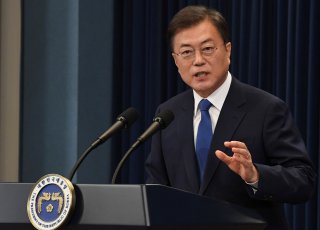South Korea: A Middle Power in the Making?
South Korea might have money and tools which are necessary for a middle power, but its society still lacks global vision and the sense of the global responsibilities.
Is South Korea a middle power? This question might be difficult to answer—not least because the term ‘middle power’ is rather nebulous and poorly defined. However, there is little doubt that South Koreans now clearly see themselves as a middle power—and try to act accordingly.
Indeed, in recent few years a sense of triumphalism is in the Seoul’s air—especially among the numerous supporters of the left-leaning Moon Jae-in’s administration. The media writes about Korea’s new global reach, and the book titled The Era of Overtaking has become a major bestseller. Among other things, the book insists that Korea is not catching up with the developed world any more, but is overtaking some major international players.
Thus, let’s follow the triumphalist zeitgeist and agree that Republic of Korea (ROK) is now a middle power indeed. After all, both the size of its GDP (roughly equal to that of Russia) and the power of its military clearly position it high at the international pecking order. If this is the case, what is special about it? How can we compare it with such indisputable middle powers as Sweden, Australia or Poland?
If we do so, we probably see that Korea is a remarkably parochial middle power, not much interested in what’s going far away from its borders, and not too eager to take the responsibilities for issues it does not see as related to its own immediate concerns.
Unlike most (not all) middle powers it is not surrounded by sympathetic neighbors and allies—and partially it has itself to blame. Its only alliance is with the United States—even though this alliance is both very important and very popular inside the country.
Logically, one expect South Korea to be on good terms with two fellow democracies nearby, Japan and Taiwan, but this is not the case. Neither is the ROK’s formal ally. The relations with Japan are marred with endless quarrels about the colonial past—far more intensive and emotional than most outsiders realize. Its relations with Taiwan are remarkably distant—perhaps, out of fear of possible complications with China, for long the major trade partner of the export-driven South Korean economy.
The great autocracy of China is not Seoul’s friend either. Initially, the attitude towards China was ambivalent, but now polls indicate the fast growing hostility towards it. South Korea feels increasingly uncomfortable in the shadow of its rising giant neighbor. Another authoritarian neighbor, Russia evokes neither much hostility nor much sympathy in the ROK, and remains a secondary trade partner anyway.
Parochial vision and values remain deeply entrenched in the South Korean society. The country is notoriously reluctant to accept refugees or grant residence rights to migrants. As of 2018, the refugee acceptance rate was three percent—very low level for a developed nation.
There are currently two and half million foreigners residing in South Korea, largely migrant workers, but it is universally assumed by the locals that all these people would sooner or later pack and leave. They interact little with the mainstream Korean society, remaining largely invisible for the average Seoulite. Their chances to ever get permanent residence rights are very low—unless they are ethnic Koreans who are treated more favorably.
This attitude to migration enjoys wide, nearly universal support in the society. Even people who actively support what in the United States would be seen as ‘progressive agenda’ on nearly all other issues, suddenly change their tune when it comes to migration. The South Koreans might be willing, as polls indicate, to see in Korea well-educated professionals from the rich countries, and they grudgingly accept the long-term presence of co-ethnics. However, when it comes to other migrants, these these citizens of the poor countries are seen as acceptable only as long as they remain obedient semi-skilled and unskilled workers on a relatively short stay. Given the harsh realities of the record-low fertility and high-speed population aging, this approach is hardly realistic, but it has deep roots and will not change soon.
In other words, South Korea might have money and tools which are necessary for a middle power, but its society still lacks global vision and the sense of the global responsibilities. Most of the country’s global undertakings and initiatives are likely to remain decorative and symbolic. South Koreans nowadays like to fancy themselves as a middle power with global reach, but the South Korean voters and taxpayers are still reluctant to see significant resources being used on issues which are not clearly related to their and their country’s immediate interests.
Andrei Lankov is a Professor at Kookmin University, Seoul.
Image: Reuters

